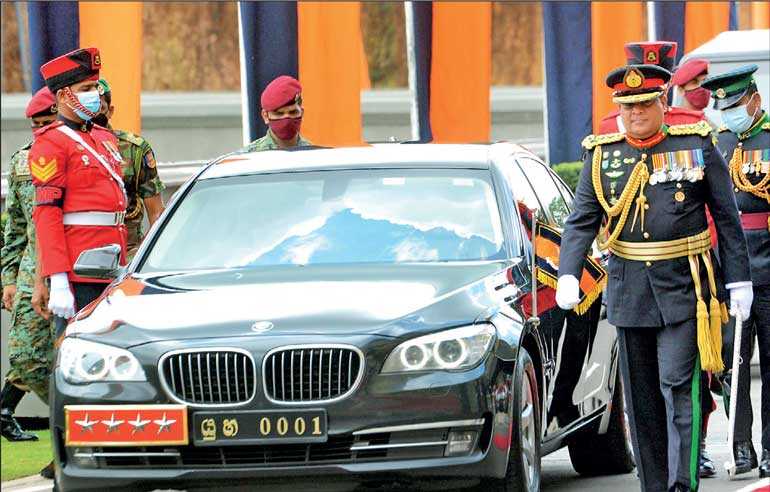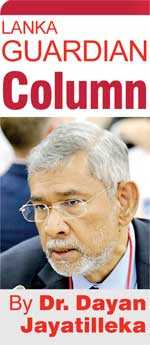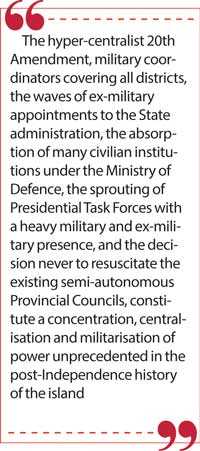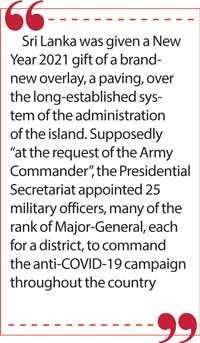Thursday Feb 19, 2026
Thursday Feb 19, 2026
Wednesday, 6 January 2021 00:07 - - {{hitsCtrl.values.hits}}

While it appears that President Gotabaya Rajapaksa wishes to hand over the running of Sri Lanka to the military, serving or retired, the Sri Lankan military must realise that this expansionism into civilian spheres and the occupation of the State as a new ruling stratum or power-elite, is not in its enlightened self-interest, subjects it to overstretch and makes it vulnerable. Pictured is Army Commander General Shavendra Silva at a special Army parade held last week to felicitate his promotion as a General – Pic by Pradeep Pathirana
Clearly, President GR has decided against holding elections to the Provincial Councils under the 13th Amendment. Ever. Minister Mahinda Amaraweera told the Sunday Times, “We decided to postpone the PC elections until the new constitution is adopted. It will be accompanied by a new electoral system.” (Political Editor, 3 January)
PC elections until the new constitution is adopted. It will be accompanied by a new electoral system.” (Political Editor, 3 January)
The new Constitution will kill the 13th Amendment and the semi-autonomous PC system, de-linking the Sri Lankan state from the Indo-Lanka Accord, removing not only a counterweight to de facto military rule over the island but also a buffer against any potential foreign presence in Trincomalee contrary to the Accord’s Annexures.
Beijing-Colombo consensus
Perhaps entirely coincidentally, this takes place against the backdrop of a significant development, an official Chinese statement on 1 January which made a commitment to promote the “alignment” of the Belt and Road Initiative with the election manifesto of President Gotabaya Rajapaksa and signalled a special political axis between Chinese President Xi Jinping and President GR.
‘China will promote the alignment of the ‘Belt and Road Initiative’ (BRI) with President Gotabaya Rajapaksa’s ‘Vistas of Prosperity and Splendour’ manifesto to promote economic and social engagement between the two countries, Chinese Ambassador Qi Zhenhong said in a New Year message issued yesterday…’
“Guided by the important consensus reached by our leaders, we join hands to respond to the challenging international and regional situation. We promote the alignment of the ‘Belt and Road Initiative,’ together with the ‘Vistas of Prosperity and Splendour” – (China will promote alignment between BRI and President’s manifesto: Ambassador | Daily FT)
Would President Gotabaya Rajapaksa care to tell the Sri Lankan citizenry what “the important consensus reached by our leaders”, namely President Xi and himself, is? 
The BRI is China’s grand strategic initiative which helps enhance connectivity and counterbalance in the world economy and provides much-needed funding for infrastructure. Sri Lanka has rightly welcomed it and strives to benefit from it.
What is rather awkward is the ‘deviation’ from state-to-state ties of a non-partisan or bipartisan character (China-Sri Lanka) to a new policy signalled by:
(1) An explicit reference to the shared views of political leaders (“the important consensus reached by our leaders”) and
(2) The alignment of a grand strategic global venture with the election manifesto of a leader (“We promote the alignment of the ‘Belt and Road Initiative,’ together with the ‘Vistas of Prosperity and Splendor”).
(3) The explicit reference to a joint stand (“join hands”) in responding to the “challenging international and regional situation”.
If as the Chinese statement says, Sri Lanka and China, guided by the (undisclosed) consensus arrived at by their two leaders, will join hands in responding to challenging international and regional situations, then Sri Lanka is hardly “neutral and nonaligned” (whatever that means and in whichever order) or “neutral” or “nonaligned”. If President GR’s Sri Lanka has joined hands with China to respond to challenging international and regional situations according to a consensus between the two leaders, how will it take a nonaligned, equidistant or balanced stand with regard to US-China internationally and India-China regionally?
Is the price for Beijing’s “alignment” of the BRI with President GR’s manifesto, Sri Lanka’s “alignment”—and joining hands—with Beijing’s policy on international and regional situations i.e., China’s foreign and strategic policy line?
This is new. One does not recall Sri Lanka’s close friend Premier Zhou Enlai, speaking of “the important consensus reached by” Mao and Sirimavo or of aligning Chinese economic assistance with the election manifestoes of either SWRD Bandaranaike or Sirimavo Bandaranaike. China’s Premier Wen Jiabao’s 2005 visit during the tenure of President Chandrika Bandaranaike Kumaratunga (daughter of China’s best Ceylonese friends SWRD and Sirimavo Bandaranaike) was mainly to open the new building of the Bandaranaike Center of International Studies (BCIS) gifted by China, and unveil the bust of Premier Zhou. I was present to welcome him in the company of Foreign Minister Kadirgamar as a member of the Governing Council of the BCIS which Minister Kadirgamar chaired. Premier Wen’s speech which remained within the traditional parameters of warm, close friendship and never strayed into domestic political endorsements.
The latest Chinese statement (New Year 2021) indicates that China regards not merely Sri Lanka but more especially President Gotabaya Rajapaksa and his political project in a special category or sub-category. China has openly indicated that it is a political partner and ally of President GR. If China is  willing to align the BRI with his election manifesto, then surely it is invested in his incumbency and political project.
willing to align the BRI with his election manifesto, then surely it is invested in his incumbency and political project.
What interests me as a student of international relations are the following:
(A) China’s explicit political patronage has, so far, been limited to those states it has geographical continuity/connectivity with.
(B) In South Asia, it hasn’t made explicit commitments of this nature about Prime Minister Imran Khan’s election manifesto—though its strategic investment in Pakistan as a state is qualitatively deeper than in Sri Lanka. China’s political footprint is large in Nepal, but Nepal is adjacent and there is a party-to-party relationship between ruling Communists.
(C) Sri Lanka, a long-standing democracy and devoid of geographic contiguity with China, is an outlier and could be a test-case of a new assertiveness.
(D) When Putin’s Russia perceived a potentially hostile (NATO) buildup on its flank in Georgia and the Ukraine, it activated its patronage of Russian-speaking minorities who were the majorities in the regions of those countries adjacent to Russia. What is India’s threat-perception of China’s power-projection on its southern flank, and what is its deterrence policy?
The Xi Factor is the X Factor. How will the “alignment” of the BRI with the Sri Lankan President’s election manifesto prove to be “aligned” with Sri Lanka’s enlightened national interest once the global Great Game begins to change with new tenants in the White House on January 20th?
The Pakistan model
The project of President Gotabaya seems to be the conversion of Sri Lanka from an uninterrupted, long-standing democracy and open society, into a second Pakistan, with a permanent overarching military establishment either producing political leaders as in the past or constraining civilian political leaders within parameters set by the military establishment. This is also the Myanmar model. In both cases religion also plays a role as state ideology. The adoption of a Pakistan-Myanmar garrison state model by Sri Lanka would significantly facilitate a strategic interlock with China as it does in both cases, irrespective of the civilian leadership. This would have grave strategic implications on India’s southern flank. Sri Lanka would be the second prong of a pincer.
New Year’s Day 2021 was the lowest point in the history of the Sri Lankan public service. Not only did public servants have to take an oath to implement an election manifesto, but they were seen to do so with a salute known in modern history as that of the first fascist leader, Benito Mussolini. It is a salute used throughout the world, including the USA, by fascist and neo-Nazi militia. It is the salute used by the Pongu Thamil crowds (2003) gathered before the portrait of Prabhakaran. (Public Servants take oaths to implement President’s manifesto | Times Online – Daily Online Edition of The Sunday Times Sri Lanka).
Sri Lanka was given a New Year 2021 gift of a brand-new overlay, a paving, over the long-established system of the administration of the island. Supposedly “at the request of the Army Commander”, the Presidential Secretariat appointed 25 military officers, many of the rank of Major-General, each for a district, to command the anti-COVID-19 campaign throughout the country.
The official statement (as reported by the regime-friendly Ada Derana) warrants quoting, though for reasons of brevity I shall omit the list of the 25 officers and districts. It read as follows:
“Twenty-five Senior Army Officers have been appointed with effect from today (01 January) to coordinate the Covid-19 control operations in each district, says the Army Media.
Appointments were made by the Presidential Secretariat, on the recommendation of Army Commander General Shavendra Silva, taking into account the urgent need for enhanced island-wide coordination for Covid-19 control work.
Adding significance to the new responsibilities on the very day he was felicitated at the Army Headquarters upon his promotion, General Shavendra Silva awarded those letters of appointment for those 25 Chief Coordinating Officers in all districts last morning (31).
Accordingly, the new office of Chief Coordinating Officers would facilitate smooth conduct of district-wise quarantine centers, transportation of individuals for quarantining and treatment, supply of medicine, equipment, dry-rations and other essentials and all other technical requirements as and when deemed necessary, the Army Media said in its statement” – Senior Army officers appointed to coordinate COVID-19 control work in each district (adaderana.lk)
Who made the appointments? The Presidential Secretariat. Under whose signature? According to which regulations? The statement says the appointments were made by the Presidential secretariat “on the recommendation of Army Commander General Shavendra Silva”. Is this true? Since when does the Presidential Secretariat act “on the recommendation” of any of the Service chiefs? Why isn’t there a single mention of the President who is the Commander-in-Chief and the Minister of Defense?
The statement reads “General Shavendra Silva awarded those letters of appointment for those 25 Chief Coordinating Officers in all districts last morning.” Is this in accordance with established rules and procedures? These are not wartime appointments of command, and even those were probably approved by the President and the National Security Council in the Mahinda Rajapaksa wartime years. In a purely public matter of administration in peacetime, should not the letters of appointment of 25 Chief Coordinating officers of the districts of the island have been handed over by the elected President, with the Army commander in attendance or at the least, in the presence of the President and his senior staff, by the Army commander?
Then there are the matters of occasion and venue. Appointments made by the Presidential Secretariat should take place there. Instead, as the report notes:
“…Adding significance to the new responsibilities on the very day he was felicitated at the Army Headquarters upon his promotion, General Shavendra Silva awarded those letters of appointment for those 25 Chief Coordinating Officers in all districts last morning (31).”
The remit of the new appointees is quite wide. The report sets these out:
“Accordingly, the new office of Chief Coordinating Officers would facilitate smooth conduct of district-wise quarantine centres, transportation of individuals for quarantining and treatment, supply of medicine, equipment, dry-rations and other essentials and all other technical requirements as and when deemed necessary, the Army Media said in its statement.”
What does “facilitate smooth conduct” mean? What do “and other essentials and all other technical requirements as and when deemed necessary” mean? Who “deems them necessary” and by what authority, derived from which source and process?
How does this work and what is the chain of command? Do the heads and personnel of all institutional bodies and the personnel, the employees right down to the level of labor, i.e., everyone from doctors to drivers, involved in the listed subjects and areas, come under the newly appointed Military Coordinators? Note that the areas listed are elastic or lend themselves to elasticity.
Where are the public administrators, the ones who have passed examinations in the subjects and risen up the ranks to head the provincial and district administrations, and the professionals who head the institutions carrying out the subjects and functions, in this picture? Do they come under the orders of the military coordinators? How far down the line does the military authority run? Do the public servants at every level—including heads of Departments and other sections—take the orders of their respective institutional heads or those of the military coordinators in the broad swathe of matters deemed necessary for Covid-19 control?
Do doctors take orders from the military coordinators? Do the military coordinators have any professional education and training plus experience that is superior to that of the civilian administrators in the fields listed?
None of this makes when it comes to COVID-19 control. As the country’s senior-most virologist who is also one the most senior leaders of the ruling coalition, Prof. Tissa Vitharana, clearly said on the record:
“Q: …What are your views/concerns about keeping aside experienced individuals like you and allowing the military to take control of the matters?
A: It started as a military exercise for the simple reason that the military was ready at hand, organised, quick to get into action and enforce restrictions initially. But now it is entirely a matter for the health personnel to handle which should be supported by the army and the police.” (Daily Mirror – “There were no virologists in the committees set up” – Prof. Vitharana)
Be that as it may, the new structure does make sense in another dimension. It places a heavy military lid on the country’s State administration. It pretty much hands over the administration of 25 districts, i.e., the island, to a military apex body.
Garrison State
Given the fact that the pandemic is the central and overriding concern, which of the functions of the state and even the private and informal sectors would not come under the sphere of authority of the new military coordinators?
An undefined zone of the State and private sector has been carved out as the military’s sphere of influence.
This is in addition to the obvious point that what we have as of 1 January is a de facto structure of Military Governors for every district.
Did the PM and the Cabinet deliberate upon and endorse this? If so when, and why wasn’t it announced at the time?
The hyper-centralist 20th Amendment, military coordinators covering all districts, the waves of ex-military appointments to the State administration, the absorption of many civilian institutions under the Ministry of Defence, the sprouting of Presidential Task Forces with a heavy military and ex-military presence, and the decision never to resuscitate the existing semi-autonomous Provincial Councils, constitute a concentration, centralisation and militarisation of power unprecedented in the post-Independence history of the island.
While it appears that President Gotabaya Rajapaksa wishes to hand over the running of Sri Lanka to the military, serving or retired, the Sri Lankan military must realise that this expansionism into civilian spheres and the occupation of the State as a new ruling stratum or power-elite, is not in its enlightened self-interest, subjects it to overstretch and makes it vulnerable.
Be it corona-control or anything else outside the area of defence, the Sri Lankan military is being overstretched; moved into a quagmire. Any failure in fields in which it has no training and experience, will cause public disaffection to encompass not only the political leadership but also the military. Any friction with civilians be they officials, professionals or a multitude of working people, and social disaffection will rise, tarnishing the military. Finally, the military will be forced to retrench either by domestic unrest or external pressure or both. It is better to pull-back now.